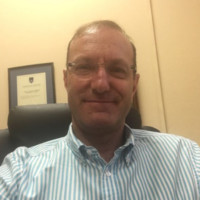Dr Julien Trokis
Dr Julien Trokis was born and bred in Cape Town, and after qualifying as a pharmacist, he studied medicine at the University of Cape Town. After stints in obstetrics and gynaecology, and paediatrics, as well as working in the UK, he began work in general practice in the northern suburbs of Cape Town.
After some years of practice, he began to see that many of his patients who suffered from heart attacks or strokes (often fatal), also suffered from diabetes. Since his father also had diabetes, this really felt close to home. He feIt that when he got up every morning and went to work, he could be making a significant difference to his patients’ lives. In short, he wanted to save lives, as well as improve the quality of life of his patients.
He began to realize that in order to save patients’ lives, he needed to treat their diabetes and associated risk factors in the best way possible. After completing the CDE course in diabetes management at the Centre for Diabetes and Endocrinology in Johannesburg, he began his post-graduate studies in diabetes. Cardiff University is well-known as a top teaching institution in diabetes, and draws students from across the world. Determined to gain as much knowledge as possible, he worked extremely hard at his studies, and graduated amongst the top 4 doctors worldwide.
As the top student from South Africa, he was awarded the CDE Ascending Star award in 2012, and as part of the award, he was invited to give a lecture at the prestigious CDE congress in Johannesburg. By this time, he had developed a special interest in diabetic kidney disease, and so he spent a further 7 months studying this condition, and preparing his talk, as well as few more months writing journal articles on this condition.
Given his love of the academic side of medicine, he was requested more and more to give talks on diabetes to colleagues, and now some 8 years down the line, he has lectured extensively, both locally and nationally, as well as internationally. He has also taught for 4 years in the department of medicine (diabetes clinic), Victoria Hospital/ University of Cape Town.
Besides running a busy diabetes clinic, he also runs a large clinical trial centre, and have been an investigator in over 80 clinical trials, approximately half of which were as principal investigator. Due to his special interest in diabetic kidney disease, he has been national principal investigator for South Africa in two large international clinical trials in diabetic kidney disease.
Julien has also been privileged to attend many international conferences and specialized courses in diabetes, and in 2014 he was selected to attend the American Diabetes Association Scholars Program, as well as attend their congress as an invited delegate. However, Julien feels that he is just a doctor trying to help his patients. Over time, he noticed that many patients who had been referred to him had been made to feel that they were to blame for their poor diabetes control. They were made to feel as if they were to blame for their struggles with their weight, and they were simply labelled as bad patients. And yet, they had often not been given the basics about their condition. Due to an interest in aviation, he did some flying some years ago, and he liked to compare trying to live with diabetes with trying to fly an aircraft. Just as an aircraft is a complex piece of machinery, diabetes is a complex medical condition, and can you imagine the results if one were just put inside an aircraft and told to fly it!
Julien has had many patients present to him after suffering complications of their diabetes and blood pressure, some with previous kidney transplants, and even a previous heart transplant. What was common amongst these patients? None of them understood the physiology of their condition (what essentially was happening inside their bodies), why they needed to take certain medications, or how their medications worked. They struggled to use their insulin correctly, and continued to struggle with poor diabetes control even after needing an organ transplant. Julien feels that every patient is unique, and one cannot adopt a “one size fits all” approach in managing a patient with diabetes. Based on our genetic profile, we all have different responses to medication, we may respond to diets differently, there is even some early data suggesting that an individual’s gut microbes may influence their eating behavior.
Since his late father had type 2 diabetes, Julien is genetically programmed with a potential to develop diabetes. So he tries to live life as if he already has diabetes. He tries to limit his carbs, to eat healthy plant-based fats, and to not snack unnecessarily. But, he feels it is not always easy. He has days that he feels like he has failed, like he would be a bad example to his patients. He has sometimes missed gym when he really could have made it, and then feels bad when he sees all the folk out running when he is driving home. But he feels this reminds him that each patient is human, like himself, with weaknesses like him, and bad days (or months) like him. He likes to think of himself as being somewhat similar to a golf coach. He can analyze your swing, and tell you what you need to do to hit the ball better. But he never judges or criticizes, because he may not be able to hit the ball as well as you anyway.
Having said that, he is extremely passionate about diabetes care, and will always try 150 percent to improve your health. So, if you want to improve your diabetes control and overall health, then he hopes to meet you, and hopes to impart some of his passion for diabetes care to you.
